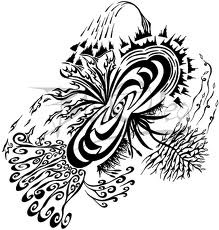Bare-assed Consulting 1.4: The Mess

The bare-assed consultant only rarely resorts to sorting through—physically re-ordering—any mess. He first sits with it instead, under the belief that until he’s sat with the chaos, he’s unlikely to understand its nature well enough to avoid making that mess even messier. I make a crucial distinction, though, between sitting with the mess and plopping myself down in the middle of it.
Sitting in the mess might merely proliferate the mess, while sitting with it seems more likely to help me understand its nature. For every apparent mess contains some central organizing principle, some subtle ordering mechanism which cannot be appreciated or understood by running around inside it, no matter how decisively one engages. Entering a hair on fire mess seems most likely to just catch my hair on fire, too. Where’s the leverage in that?The first stage of a bare-assed consultant’s response to any genuine mess might look like nothing more frantic than a casual winding of his watch. If the first imperative involves doing no harm, winding my watch could scarcely be more harmless. Of course, for anyone frantically failing to avoid a mess or to quickly tidy one up, this laconic entree seems ridiculous, even dangerous, perhaps foolish.
We usually think of stuck as a static state, but frantic action can be equally or even more entrapping. I have found many clients so exhausted from doing frantic battle with their messes that their chief difficulty has become that mindlessness resulting from extended response to any alarming stimulus. Reduced to the mindful reactions of your typical amoeba, they ask for advice on what might constitute the best resolution, a perfect ‘tell’ that they’ve lost their minds: Asking for best when even worst would do.
So I sit with their mess. I’m in far from a placid state of mind, then, though. My mind might well be racing, but at least I’m not stumbling over my two left feet, or theirs. Sitting with the mess seems a completely unreasonable response, and I’m fully aware of its apparent incongruity. I won’t sit long, just long enough. Long enough to find some thread of a cohering story, some explanatory metaphor which might serve as a preliminary handle on this otherwise undifferentiated chaos because the path from mess to masterpiece seems paved with metaphor.
Mess might be best described as any situation lacking a sufficiently explanatory story, and order as any situation where a story more fully explains. It seems unlikely that most messes might be contained by merely posing a metaphorical explanation, no mops and messy scrub-downs really necessary. The complaining software company who didn’t know that they were actually coding at several times the rate and quality of their industry’s leader. The non profit executive director who innocently mistook masterful for unconscionably messy. How could they have known, absent the perspective, that what certainly felt like unending chaos constituted close to the crown of creativity?
Fixing should be reserved for those rare occasions when surgery has been shown to be absolutely necessary. Of course, every client believes themselves to be uniquely beset, and both fear and pine after major surgery. Cutting them open might justify their tenacious inability to resolve their mess, exonerating them from at least self-blame. How could they have been culpable when the situation required an experienced surgeon’s scalpel hand? How, indeed?
The bare-assed consultant understands that 98% of all apparent dysfunction cures itself, and not by clever prescribing or skillful surgeries. The context might shift, rendering moot whatever difficulty previously alarmed. Or, a metaphor might cohere even the most threatening chaos into tolerable variety. The bare-assed consultant wonders how their client might better cope with the mess before he ever considers acting to make it more orderly because messy might just be the natural state of everything.
The bare-assed consultant’s hinder’s really flapping in the wind on these engagements, when their perfectly reasonable response seems imperfectly unconscionable at first. Some empathic alarm might be displayed, if only to keep the client engaged while they discover their explanatory story. The bare-assed consultant will only rarely be carried on anyone’s shoulders through any triumphant arch, and not only because nobody wants that bare behind resting on their shoulder. Alarm receding, nothing much should seem to have happened. The crises should seem rather like a fading nightmare, a temporary intrusion into an otherwise orderly existence. The story continues without the metaphor maker leaving any discernible tool marks.
©2012 by David A. Schmaltz - all rights reserved


